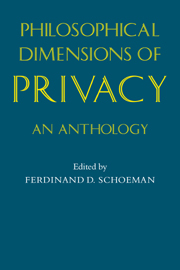Book contents
- Frontmatter
- Contents
- List of contributors
- Preface
- 1 Privacy: philosophical dimensions of the literature
- 2 Social distance and the veil
- 3 The origins of modern claims to privacy
- 4 The right to privacy [the implicit made explicit]
- 5 Privacy [a legal analysis]
- 6 Privacy as an aspect of human dignity: an answer to Dean Prosser
- 7 Privacy [a moral analysis]
- 8 Privacy, freedom, and respect for persons
- 9 Privacy and self-incrimination
- 10 Intimacy and privacy
- 11 The right to privacy
- 12 Why privacy is important
- 13 Privacy, intimacy, and personhood
- 14 Privacy: some arguments and assumptions
- 15 An economic theory of privacy
- 16 Privacy and the limits of law
- 17 Privacy and intimate information
- Selected bibliography
- Index of names
6 - Privacy as an aspect of human dignity: an answer to Dean Prosser
Published online by Cambridge University Press: 12 December 2009
- Frontmatter
- Contents
- List of contributors
- Preface
- 1 Privacy: philosophical dimensions of the literature
- 2 Social distance and the veil
- 3 The origins of modern claims to privacy
- 4 The right to privacy [the implicit made explicit]
- 5 Privacy [a legal analysis]
- 6 Privacy as an aspect of human dignity: an answer to Dean Prosser
- 7 Privacy [a moral analysis]
- 8 Privacy, freedom, and respect for persons
- 9 Privacy and self-incrimination
- 10 Intimacy and privacy
- 11 The right to privacy
- 12 Why privacy is important
- 13 Privacy, intimacy, and personhood
- 14 Privacy: some arguments and assumptions
- 15 An economic theory of privacy
- 16 Privacy and the limits of law
- 17 Privacy and intimate information
- Selected bibliography
- Index of names
Summary
Introduction
Three-quarters of a century have passed since Warren and Brandeis published their germinal article, “The Right of Privacy.” In this period many hundreds of cases, ostensibly founded upon the right to privacy, have been decided, a number of statutes expressly embodying it have been enacted, and a sizeable scholarly literature has been devoted to it. Remarkably enough, however, there remains to this day considerable confusion concerning the nature of the interest which the right to privacy is designed to protect. The confusion is such that in 1956 a distinguished federal judge characterized the state of the law of privacy by likening it to a “haystack in a hurricane.” And, in 1960, the dean of tort scholars wrote a comprehensive article on the subject which, in effect, repudiates Warren and Brandeis by suggesting that privacy is not an independent value at all but rather a composite of the interests in reputation, emotional tranquility and intangible property.
My purpose in this article is to propose a general theory of individual privacy which will reconcile the divergent strands of legal development—which will put the straws back into the haystack. The need for such a theory is pressing. In the first place, the disorder in the cases and commentary offends the primary canon of all science that a single general principle of explanation is to be preferred over a congeries of discrete rules.
- Type
- Chapter
- Information
- Philosophical Dimensions of PrivacyAn Anthology, pp. 156 - 202Publisher: Cambridge University PressPrint publication year: 1984
- 20
- Cited by



